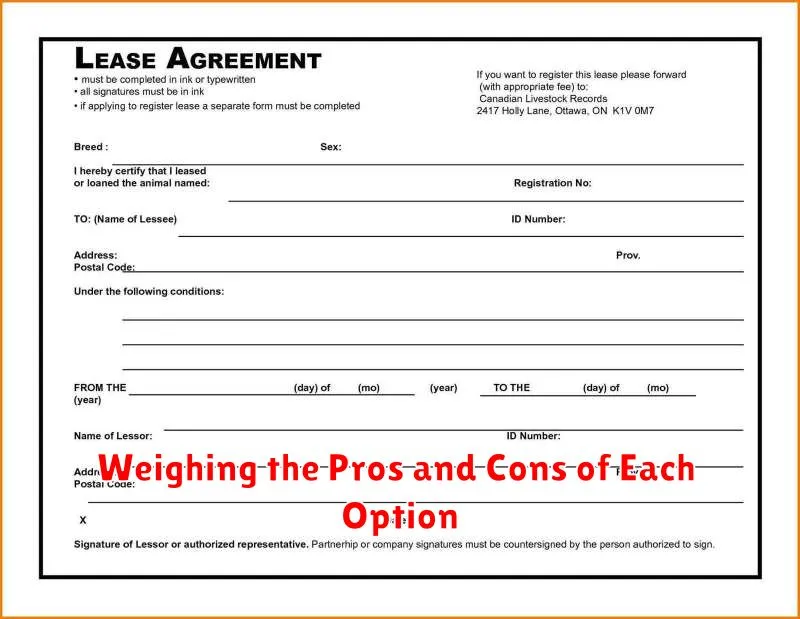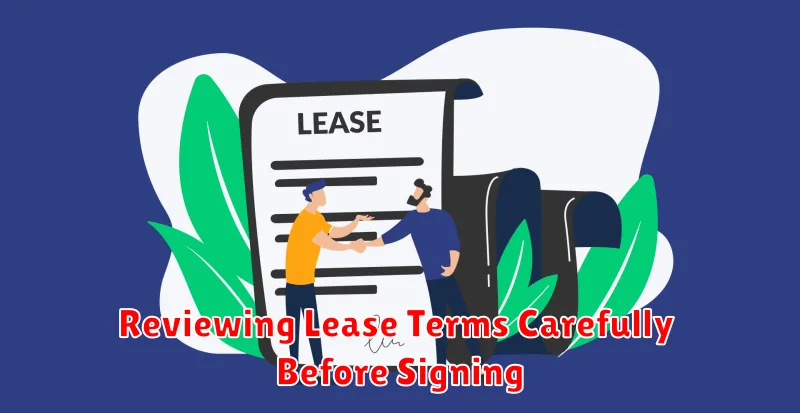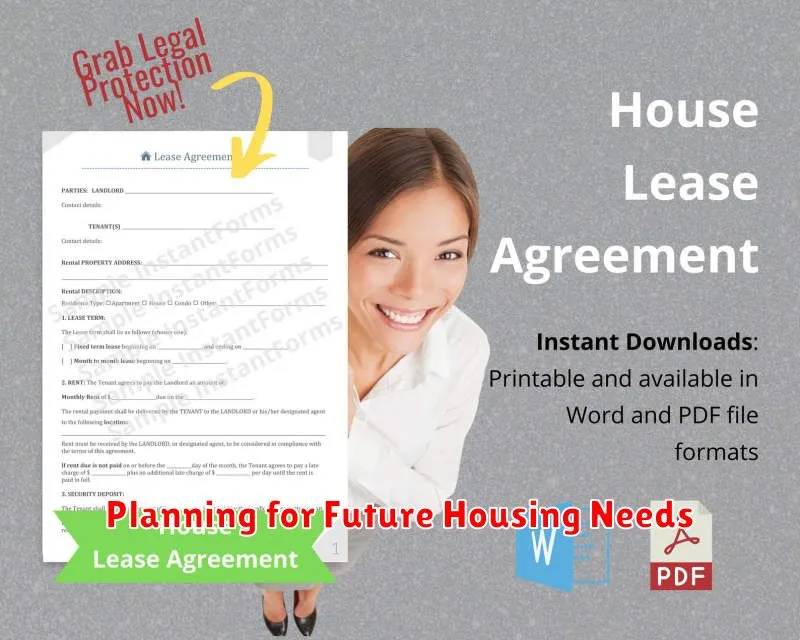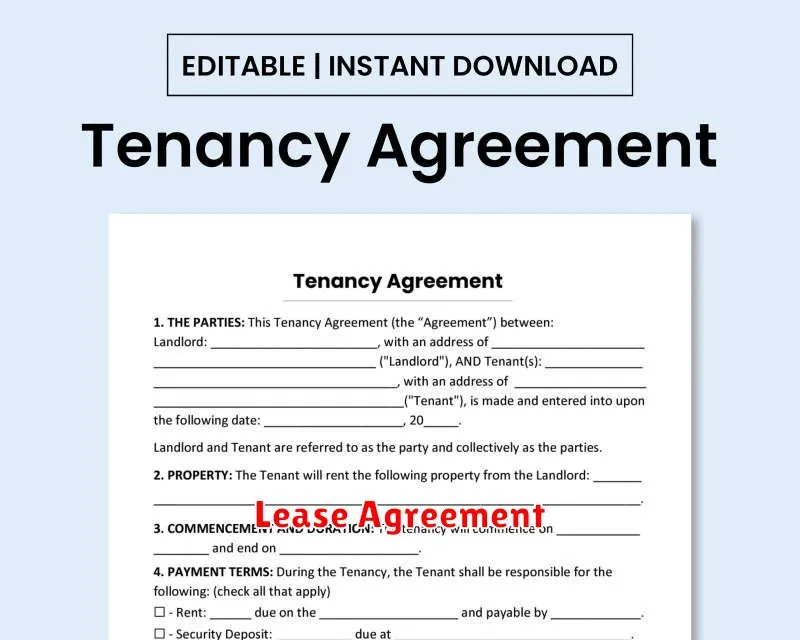Choosing the right lease term for your lifestyle can be a daunting task. It’s a decision that could affect your finances, your mobility, and your overall satisfaction with your living situation. Lease terms can range from short-term options like month-to-month agreements to long-term commitments of several years. This article will guide you through the various factors to consider when selecting a lease term that best aligns with your needs and circumstances. We’ll delve into the pros and cons of different lease durations, analyze factors like job stability, personal goals, and financial considerations, and ultimately empower you to make an informed decision.
Understanding Different Lease Terms
Choosing the right lease term is an important decision for anyone renting a property. It can affect your budget, your lifestyle, and your overall experience as a tenant. To make the best choice for your needs, it’s essential to understand the different lease terms available and their implications.
Here are some of the most common lease terms:
Short-Term Leases (6-12 Months)
Short-term leases offer flexibility and can be ideal for those who are uncertain about their long-term plans or who are looking to try out a new neighborhood before committing to a longer lease. They are also suitable for individuals or families who need temporary housing due to relocation, renovations, or other life changes.
Standard Leases (12 Months)
Standard leases provide a balance between flexibility and stability. They are the most common type of lease and offer tenants the assurance of knowing their living situation for a full year. This predictability can be beneficial for budgeting and planning purposes.
Long-Term Leases (2-3 Years)
Long-term leases can offer significant savings in the form of lower monthly rent or special incentives from landlords. However, they also limit flexibility and may not be suitable for those who are unsure about their long-term plans.
Month-to-Month Leases
Month-to-month leases offer the most flexibility, allowing tenants to terminate their lease with minimal notice. However, they often come with higher monthly rent and less security as landlords can increase rent or terminate the lease with a specific timeframe.
Understanding the different lease terms and their implications is crucial when choosing the right lease for your lifestyle. Consider your personal circumstances, your budget, and your future plans before deciding on the lease term that best suits your needs.
Evaluating Your Lifestyle and Needs
Before you sign a lease, it’s crucial to evaluate your current lifestyle and future plans. This involves considering your current and expected needs, along with your financial stability. For example, if you anticipate significant life changes like a job relocation, marriage, or starting a family, a longer lease term might not be ideal. It’s always best to be prepared for potential changes in your life and choose a lease term that offers flexibility.
Consider factors like your job stability, travel plans, and any anticipated changes in your living situation. If you have a stable job and expect to stay in your current location for an extended period, a longer lease term might provide cost savings and peace of mind. On the other hand, if your career is flexible or if you’re planning to relocate soon, a shorter lease term could be a better option. A shorter lease term provides you with the freedom to move without the burden of a long-term commitment.
It’s also important to assess your financial situation. Can you comfortably afford the monthly rent payments for the duration of the lease? Consider your income, expenses, and any potential changes in your financial stability. If you are uncertain about your future financial situation, it might be prudent to choose a shorter lease term, giving you more flexibility to adjust your housing arrangements as needed.
Considering Short-Term vs. Long-Term Leases
When choosing a lease term, it’s crucial to assess your personal lifestyle and priorities. Both short-term and long-term leases have their own set of advantages and disadvantages.
Short-term leases, typically lasting for six months to a year, offer flexibility. They are ideal for those who are uncertain about their future living arrangements, such as recent graduates, travel enthusiasts, or individuals seeking a temporary relocation. Short-term leases allow for greater adaptability to changing circumstances, such as job opportunities or personal commitments.
However, short-term leases often come with higher rental rates compared to longer-term leases. Additionally, you may face the inconvenience of relocating more frequently, which can involve moving costs, finding new accommodations, and adjusting to unfamiliar surroundings.
On the other hand, long-term leases, typically extending for two to three years, offer stability and predictability. They provide a sense of security and can often result in lower monthly rent. Long-term leases are suitable for individuals who have established roots in a particular location and seek a steady living environment.
However, long-term leases can limit your flexibility. They may be restrictive if your circumstances change unexpectedly, such as a job transfer or a change in family dynamics. You may be obligated to pay a break lease fee if you terminate the agreement early.
Ultimately, the choice between short-term and long-term leases depends on your personal needs, financial situation, and lifestyle. Carefully consider your priorities and make an informed decision that aligns with your unique circumstances.
Assessing Your Financial Situation
Before you even start considering lease terms, it’s crucial to assess your financial situation. This includes understanding your income, expenses, and overall financial health. Take a close look at your budget and see how much you can comfortably afford to spend on rent each month.
Consider your debt-to-income ratio, which is the percentage of your monthly income that goes towards debt payments. A lower ratio indicates you have more financial flexibility. Also, think about any savings you might want to use as a safety net or for future goals.
Understanding your financial picture will guide you in choosing a lease term that fits your budget and doesn’t put unnecessary strain on your finances. It’s important to be realistic and choose a lease term you can comfortably manage without compromising your financial stability.
Thinking About Your Future Plans
When choosing a lease term, it’s crucial to consider your future plans. Are you planning on staying in the area for a long time, or are you more likely to move within a few years? If you’re unsure, it’s best to err on the side of caution and choose a shorter lease term. This will give you more flexibility if your plans change.
If you’re planning on starting a family or getting married, you may want to consider a longer lease term to ensure you have a stable place to live. However, if you’re planning on going to graduate school or taking a job in another city, a shorter lease term will give you more options.
Ultimately, the best lease term for you will depend on your individual circumstances. But by taking the time to think about your future plans, you can make a decision that works for you.
Negotiating Lease Terms with Your Landlord
Once you’ve chosen a lease term that aligns with your lifestyle, it’s time to negotiate with your landlord. While landlords have their own set of priorities, they’re generally open to negotiation, particularly if it means securing a good tenant. Be prepared to present your case clearly and respectfully, focusing on the benefits of your proposal to both parties.
Start with understanding your landlord’s needs: Are they looking for a long-term tenant for stability or someone flexible for shorter periods? Knowing their goals can inform your negotiation strategy.
Be clear about your goals: Communicate your desired lease term and any specific requests, such as flexibility on move-in dates or options for early termination. Be reasonable and back up your requests with valid reasons.
Explore compromises: Be open to finding common ground. Perhaps you can offer a slightly longer lease term in exchange for a lower deposit or a more favorable rent increase schedule.
Document everything: Make sure any agreed-upon terms are clearly outlined in writing and included in the lease agreement. This helps avoid misunderstandings and protects both you and the landlord.
Remember, negotiation is about finding a win-win situation for both parties. By approaching the process with respect and understanding, you can increase your chances of getting the lease terms that best suit your lifestyle.
Weighing the Pros and Cons of Each Option

Once you’ve considered your personal circumstances and financial situation, it’s time to dive into the specifics of each lease term. Short-term leases (typically 6-12 months) offer flexibility and the chance to experience a new place without long-term commitment. They’re perfect for those with a flexible lifestyle, temporary job assignments, or an uncertain future. However, they tend to come with higher monthly rent and limited flexibility in terms of lease renewals.
On the other hand, long-term leases (typically 12 months or more) provide stability and predictable rent payments. They offer significant cost savings through lower monthly rent and may come with concessions like waived security deposits or free utilities. Long-term leases are a wise choice for those who are settled in one location and value predictable expenses. However, long-term leases lock you into a place for a significant period, limiting your options if your life changes.
Finally, month-to-month leases provide the ultimate flexibility. They allow for easy termination with sufficient notice, making them ideal for those with unpredictable lifestyles or short-term needs. However, these leases tend to come with higher monthly rent and less certainty of staying in the same place.
Understanding Renewal Options
Once you’ve decided on an initial lease term, it’s crucial to understand the renewal options available to you. Most leases include clauses detailing the process and terms for extending your tenancy. Familiarize yourself with these clauses to ensure you’re well-informed about potential costs, timelines, and any required notices.
Typically, leases offer renewal options such as automatic renewal, optional renewal, or no renewal.
Automatic renewal clauses automatically extend the lease for a predetermined period unless you provide written notice to the landlord prior to the expiration date. This can be beneficial if you prefer the predictability of a continuous lease, but it’s essential to be aware of the notice period and potential rent increases.
Optional renewal allows you to choose whether or not to renew your lease at the end of the initial term. This provides flexibility but requires you to make a decision within a specific timeframe. Be prepared to renegotiate rent or other lease terms during this process.
Leases that don’t include renewal options simply expire at the end of the initial term. This means you must relocate or negotiate a new lease with your landlord if you wish to remain in the property.
By understanding the different renewal options available, you can make an informed decision that aligns with your lifestyle and long-term plans.
Making an Informed Decision
Choosing the right lease term is a crucial part of renting, impacting your financial planning, housing flexibility, and overall lifestyle. A short-term lease (typically 6 months to a year) offers flexibility, allowing you to move easily if your circumstances change. This is ideal for those who are uncertain about their long-term plans, might be relocating soon, or prefer to try out a new neighborhood before committing to a longer term.
On the other hand, a long-term lease (typically 2-3 years) provides stability and often comes with lower rent prices. If you have a stable job and anticipate staying in the same location for an extended period, a longer lease can save you money and reduce the hassle of moving. However, it can restrict your flexibility if unexpected life events require you to move earlier than planned.
Ultimately, the best lease term is the one that aligns with your individual needs and circumstances. Take time to evaluate your lifestyle, financial situation, and long-term goals before making a decision. Consider factors such as job security, personal plans, and potential future moves to ensure you choose a lease term that suits your unique situation.
Reviewing Lease Terms Carefully Before Signing

Once you’ve found a property that you like and are ready to move forward, it’s time to review the lease terms carefully before signing. This is an important step that you shouldn’t rush. Take your time to read through everything and make sure you understand all of the terms and conditions. If there’s anything you don’t understand, don’t hesitate to ask your landlord for clarification.
Here are some key things to review in the lease terms:
- Lease length: This is the duration of the agreement, typically 12 months but can be shorter or longer depending on the property and location.
- Rent amount: This is the monthly payment you’ll be making for the property.
- Security deposit: This is a refundable deposit that protects the landlord from any damages to the property during your tenancy.
- Late fees: Make sure you understand how late fees are calculated and how they affect your rent payment.
- Pet policy: If you have pets, you need to ensure your lease allows them and includes any specific pet fees or restrictions.
- Maintenance and repairs: Know who is responsible for what repairs and how they are handled.
- Termination clause: This outlines the process and conditions for breaking the lease early, including any penalties involved.
- Renewal options: Understand whether you have the option to renew your lease after it expires, and any terms associated with renewal.
By reviewing these terms carefully, you can ensure that you are signing a lease that meets your needs and protects your interests. If you have any concerns or questions, be sure to speak to your landlord before signing.
Planning for Future Housing Needs

When choosing a lease term, it’s crucial to consider your future housing needs. Think about your career goals, family plans, and any anticipated life changes. For instance, if you expect a job relocation or a growing family, a shorter lease term might be more flexible. Conversely, if you foresee stability in your life, a longer lease term can offer cost savings and peace of mind.
Consider your personal time horizon. Do you envision yourself staying in the same area for the next few years, or are you more open to moving? A shorter lease term offers greater flexibility and allows you to adjust your housing situation as your needs evolve. Conversely, a longer lease term provides stability and predictable housing costs, which can be advantageous for those seeking a settled living arrangement.

